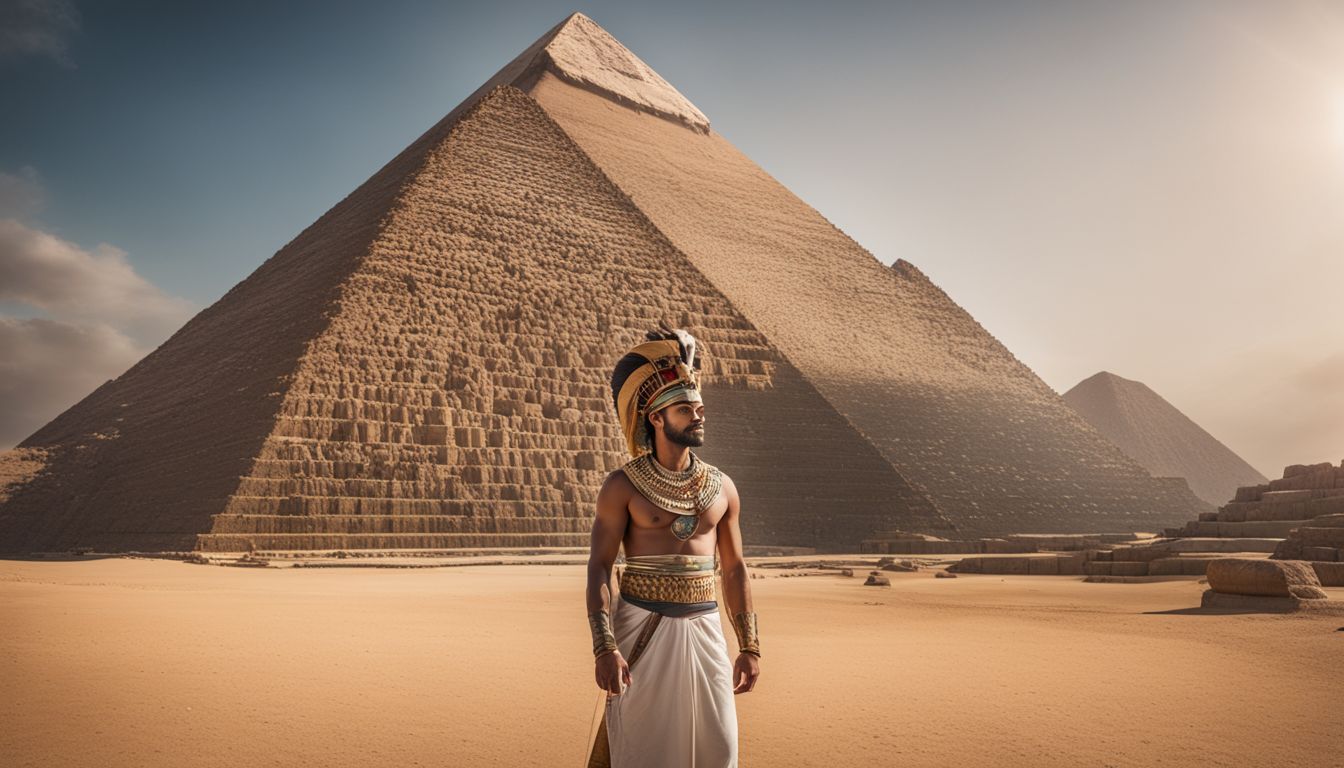Are you curious about the meaning behind ancient dreams? The dream of the Pharaoh, found in Genesis 41, is a fascinating story from the Bible. Our article will explore its significance and how it led to dramatic changes in Egypt.
Keep reading to uncover this historical mystery.
Key Takeaways
- Pharaoh’s dream predicted seven years of abundance followed by seven years of famine in Egypt, showing the importance of preparation for future hardships.
- Joseph’s ability to interpret the dream demonstrated God’s plan and promises, emphasizing trust in divine guidance during uncertain times.
- The appointment of Joseph as second-in-command in Egypt highlights how wisdom and faith can lead to unexpected positions of leadership and influence.
- The story teaches leaders today about the value of insight, strategic planning, and reliance on a higher power for guidance through challenges.
- Trusting in God’s ultimate plan is a central theme, encouraging patience and faith even when the path ahead seems unclear.
The Dream of the Pharaoh in Genesis 41
The Dream of the Pharaoh in Genesis 41 unveils its prophetic significance and Joseph’s pivotal role. The dream embodies symbolic imagery that holds a crucial message for interpretation and divine revelation.
Background and Review
In Genesis 41, Pharaoh experiences a mystifying dream that leaves his court baffled. This story captures a pivotal moment where divine revelation and human affairs intersect, showcasing the power of prophetic dreams in biblical narratives.
The Egyptian ruler’s dream involves symbols deeply rooted in the culture and livelihood of Egypt, such as the Nile River and cows, which were central to the society’s sustenance and economy.
Joseph, known for his gift of dream interpretation, is brought before Pharaoh to shed light on this perplexing vision. His ability to understand dreams as messages from God sets a course for dramatic changes not only in his own life but also across Egypt.
This narrative underscores themes of divine intervention, authority, and providence—elements that resonate throughout biblical texts dealing with prophetic visions and their impacts on human history.
Description of the Dream
Transitioning from the background and review of Pharaoh’s dream, we can delve into the vivid and mysterious details that made up this enigmatic vision. In Genesis 41, Pharaoh dreamt of seven fat cows emerging from the Nile River, followed by seven gaunt cows.
The thin cows then devoured the healthy ones.
Pharaoh’s second dream involved seven plump ears of corn being consumed by seven withered ears. These compelling images held significant symbolism and left an enduring impression on Pharaoh and all who heard them.
Joseph’s Interpretation of the Dream
Joseph interprets the dream as a prediction of seven years of abundance followed by seven years of famine. He advises Pharaoh to use the abundant years to prepare for the upcoming scarcity, ensuring survival for Egypt and neighboring regions.
Symbolism of the Dream
The symbolism of Pharaoh’s dream in Genesis 41 underscores the significance of the imagery portrayed. The fat and lean cows represent abundance and scarcity, while the healthy and withered grain signifies prosperity and famine.
These symbols ultimately convey a message about the cyclical nature of life, emphasizing the importance of being prepared for both times of plenty and times of hardship. The vivid portrayal of these contrasting images serves as a timeless reminder to embrace foresight and prudent planning in navigating life’s uncertainties.
With Joseph’s interpretation, the dream’s symbolism becomes intricately tied to God’s overarching plan for Egypt and its surrounding regions. As such, it mirrors an enduring lesson on divine providence – promoting faith in God’s sovereign control over events that impact human existence.
Connection to God’s Plan and Promises
God’s plan and promises are evident in the Dream of the Pharaoh, showcasing how God works through dreams to communicate His will. The fulfillment of Joseph’s interpretation highlights the alignment with God’s divine plan for him and the preservation of countless lives during a time of famine.
Through this narrative, it becomes clear that God’s sovereignty is unwavering, and His faithfulness extends throughout history.
The dream also serves as a reminder that despite seemingly insurmountable circumstances, God’s purpose prevails. It underscores the importance of trust in God’s ultimate plan and reaffirms that even in times of uncertainty, faith in His promises brings forth hope and direction.
Joseph’s Rise to Power
Joseph interpreted the dream, unraveling its significance and offering guidance to Pharaoh. This led to Joseph’s swift ascent as second-in-command in Egypt, where he played a critical role in implementing his interpretation of the dream.
Pharaoh’s Response to the Interpretation
Upon hearing Joseph’s interpretation, Pharaoh recognized the wisdom and insight conveyed. He was astounded by Joseph’s God-given ability to interpret dreams and discern their meanings.
Without hesitation, Pharaoh acknowledged the divine presence within Joseph and immediately implemented his advice, appointing him as second-in-command over all of Egypt.
Moving forward to Joseph’s Appointment as Second-in-Command..
Joseph’s Appointment as Second-in-Command
Upon receiving Joseph’s interpretation of the dream, Pharaoh recognized his wisdom and discernment. Without hesitation, Pharaoh appointed Joseph as second-in-command over all of Egypt.
This appointment was a testament to the trust and confidence Pharaoh had in Joseph’s abilities to navigate through the complexities of managing a nation during times of abundance and scarcity.
Relevance of Pharaoh’s Dream Today
Pharaoh’s dream provides valuable leadership lessons for today’s leaders and underscores the importance of trusting in God’s ultimate plan. It serves as a reminder that even in the midst of uncertainty, divine guidance can lead to unexpected and powerful outcomes.
Lessons for Leaders
Effective leadership is rooted in the ability to discern and interpret events, making strategic decisions. The dream of Pharaoh and Joseph’s interpretation underscore the importance of seeking divine guidance and trusting in God’s ultimate plan.
Additionally, it reveals that insightful leaders are mindful of symbolism, patterns, and layers within their surroundings. This story reinforces the value of wisdom, faith, and humility as guiding principles for leaders today.
Leaders can draw inspiration from how Joseph’s understanding of Pharaoh’s dreams led to his rise to power. It highlights the impact a leader’s insight can have on shaping destinies – not only for themselves but also for those they lead.
Trusting in God’s Ultimate Plan
Trusting in God’s ultimate plan requires faith and patience. Even when facing uncertainty, the story of Joseph and Pharaoh’s dream shows that God’s plan unfolds in His perfect timing.
Joseph’s journey from being sold into slavery to becoming second-in-command in Egypt demonstrates how God works all things together for good. The lesson for today is to trust that just as He guided Joseph, He will also guide us through life’s challenges with a greater purpose in mind.
Moving Forward: Applying Life Lessons
Conclusion
Understanding the significance behind Pharaoh’s dream reveals timeless lessons. Today, leaders can draw inspiration from Joseph’s interpretation and rise to power. Trusting in God’s ultimate plan remains a key takeaway.
The dream of the Pharaoh serves as a reminder of divine guidance and purpose.
FAQs
1. What does the dream of the Pharaoh mean in the Bible?
In the Bible, the dream of the Pharaoh is a message from God that predicts seven years of abundance followed by seven years of famine. It’s a significant example of how dreams carry symbolic meaning and reveal God’s will. From a biblical perspective, dreams are often seen as a way for God to communicate with His people, as seen in the story of Joseph interpreting the Pharaoh’s dream. In modern times, some individuals may seek to understand their dreams through a biblical lens, including the biblical perspective on cockroach dreams, to find guidance or meaning in their lives. This approach can provide comfort and insight for those who believe in the power of God’s communication through dreams.
2. Why are cows important in Pharaoh’s dream?
Cows symbolize prosperity and nourishment. In Pharaoh’s dream, healthy cows represent years of plenty, while thin cows stand for upcoming famine. This symbolism helps convey the message about future events.
3. How do people interpret biblical dreams like that of Pharaoh’s?
People see biblical dreams as ways God communicates His plans or intentions. The story of Pharaoh’s dream shows us that understanding symbolic meanings in dreams can uncover messages meant to guide or warn us.
4. Can anyone understand the symbolic meaning in dreams like those found in the Bible?
Understanding symbolic meanings in biblical dreams often requires wisdom and insight, as shown by Joseph’s interpretation of Pharaoh’s dream. While not everyone may directly grasp these symbols, they teach us about seeking deeper insights into our experiences and God’s will.





